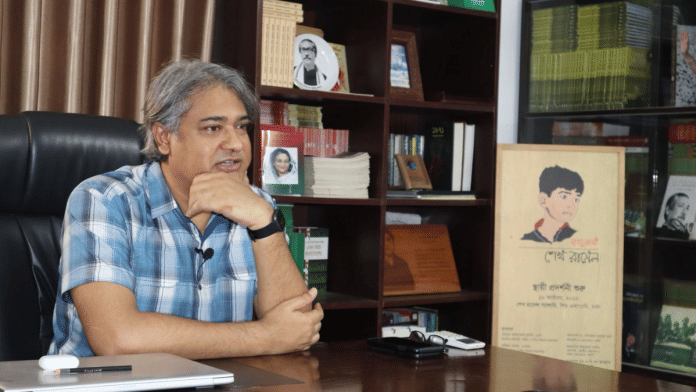Kolkata: There is little chance of national elections in Bangladesh being held in February next year, former Bangladesh MP and information minister Professor Mohammad Ali Arafat has said.
In an exclusive interview to ThePrint, Arafat further said Bangladesh Chief Adviser Muhammad Yunus will not walk the talk and try to delay and prolong his hold on power, as he could never secure his current position through a fair election.
On 5 August, the Bangladesh interim leader had announced—in a televised address on the one-year anniversary of former prime minister Sheikh Hasina’s ouster—that the next general election would be held in February 2026 to kickstart the process of transferring power to an elected government.
“In case he does call an election, it would likely exclude the Awami League, the Jatiya Party, and other smaller progressive parties from the 14-party alliance, which together represent over half of the electorate,” Arafat said over a telephonic interview.
“In that case, I suspect he might opt for a prearranged, rigged election, where seats are deliberately allocated in advance among the Bangladesh Nationalist Party, the Jamaat-e-Islami Bangladesh, and other allied smaller parties.”
The interim administration, according to the Awami League leader, has managed to run Bangladesh by turning the new students-led political party, the National Citizen Party (NCP), into its mercenary wing—”unofficial, violent, and utterly loyal”.
“Whenever it seeks to punish an individual or dismantle an institution, the Yunus administration sends in NCP operatives to create mobs, spark violence, and then dismiss the chaos as the actions of a ‘pressure group.’ When the government targeted independent media outlets, it unleashed NCP mobs. They stormed newsrooms, vandalised property, seized control, and purged dissenting journalists. Ownership changed hands under duress, and editorial independence vanished overnight,” Arafat said.
The former MP blamed the NCP also for the deteriorating law and order situation in his homeland.
On 13 August, Bangladesh local press reported an investigation commission began its inquiry into violence during an NCP programme in Gopalganj district that took place in July.
The incident has sparked nationwide outrage after four people were killed and several others were injured in clashes. While the NCP leaders blamed the Awami League and its affiliates for the violence, the interim government condemned the incident as “utterly indefensible” and pledged to bring the perpetrators to justice.
But Arafat said though it came on the back of a popular students-led stir against Hasina, there is lack of public support for the NCP. “This has been evident from the lower turnouts the NCP has seen in its latest series of rallies across the country over the past weeks. The NCP has also chosen to align itself closely with the Jamaat-e-Islami Bangladesh, an extremist Islamist outfit intent on erasing the legacy of Bangladesh’s independence struggle during the liberation war against Pakistan,” he said.
“Like Jamaat, the NCP’s leaders have publicly campaigned for the dismantling of Bangladesh’s constitution—a constitution that was foundational when it was drafted for introducing secularism for the first time in a South Asian country.”
According to the former Bangladesh minister, despite the lack of popular support, the NCP has stepped in to help the Yunus administration every time there has been a crisis.
“When the regime moved to ban Awami League, it staged a mob deploying a few dozen NCP activists to perform outrage in a heatwave. Government trucks arrived not with riot gear, but with cooling water sprays to ‘support’ the performance. Hours later, my party was banned. The regime used the same script when it targeted the former chief election commissioner and chief justice. NCP mobs appeared on cue, harassed their homes, and created just enough spectacle to justify politically motivated arrests,” he alleged.
Neither the NCP nor the Jamaat is expected to win enough seats, he said, adding that Yunus will try to hold on to power by coming up with new excuses to hold elections.
Delayed election dates have been a touchy topic among the political parties in Bangladesh. Several political parties have been raising concerns about the electoral process being manipulated to engineer a favourable outcome.
(Edited by Tony Rai)
Also Read: Good politician, bad statesman — what Muhammad Yunus’ one year in power reveals






